This is Psalms 151 as found in the Septuagint (LXX) in Greek translation (here offered with its translation into Hebrew by Avraham Kahana). The psalm as it is found in Hebrew in the Dead Sea Scrolls is designated as Psalms 151a.
| Translation (Greek) | Translation (Hebrew) | Translation (English) |
|---|---|---|
1 Οὗτος ὁ ψαλμὸς ἰδιόγραφος εἰς Δαυΐδ καὶ ἔξωθεν τοῦ ἀριθμοῦ· ὅτε ἐμονομάχησε τῷ Γολιάθ. — |
א מִזְמ֣וֺר לְדָוִ֑ד אַחֲרֵ֥י הִ֝לָּחֲמ֗וֹ אֶת־גׇּלְיָֽת׃ |
1 A psalm of David, after he battled Goliat. |
Μικροσ ἤμην ἐν τοῖς ἀδελφοῖς μου καὶ νεώτερος ἐν τῷ οἴκῳ τοῦ πατρός μου· ἐποίμαινον τὰ πρόβατα τοῦ πατρός μου. 2 αἱ χεῖρές μου ἐποίησαν ὄργανον, καὶ οἱ δάκτυλοί μου ἥρμοσαν ψαλτήριον. |
ב צָעִ֗יר הָ֭יִֽיתִי בְת֣וֹךְ אָחָ֑י וְ֝נַ֗עַר בְּבֵ֥ית אָבִֽי׃ ג רֺ֭עֶֽה בְּצֺ֣אן אָבִ֑י נוֹהֵ֖ג עֶדְר֥וֹ בַמִּדְבָּֽר׃ ד יָדַ֗י עָ֭שֽׂוּ עוּגָ֑ב אֶ֝צְבְּעוֹתַ֗י כּ֥וֹנֲנוּ נָֽבֶל׃ |
2 Young I was in the midst of my brothers, and a lad in my father’s house. 3 A shepherd of my father’s flock, driving his herd in the wilderness. 4 My hands performed upon a lute, my fingers worked a lyre. |
3 καὶ τίς ἀναγγελεῖ τῷ Κυρίῳ μου; αὐτὸς Κύριος, αὐτὸς εἰσακούσει. 4 αὐτὸς ἐξαπέστειλε τὸν ἄγγελον αὐτοῦ καὶ ἦρέ με ἐκ τῶν προβάτων τοῦ πατρός μου καὶ ἔχρισέ με ἐν τῷ ἐλαίῳ τῆς χρίσεως αὑτοῦ. |
ה וּמִ֣י יַגּׅ֣יד לַיהו֑ה י֝הו֗ה ה֥וּא יִשְׁמָֽע׃ ו ה֭וּא שָׁלַ֥ח מַלְאָכ֑וֹ וַ֫יִּקָּחֵ֥נִי מֵאַ֣חֲרֵי צֹא֣ן אָבִֽי׃ ז וַ֭יִּמְשָׁחַֽנִי בְּשֶׁ֣מֶן מִשְׁחָת֑וֹ וַיְּצַוַּ֖נִי נָגִ֣יד עַל־עַמּֽוֹ׃ |
5 And who can tell YHVH? YHVH – He will hear. 6 He sent His messenger, and took me from after my father’s flock. 7 And He anointed me with anointing oil, and appointed me a prince of my people. |
5 οἱ ἀδελφοί μου καλοὶ καὶ μεγάλοι, καὶ οὐκ εὐδόκησεν ἐν αὐτοῖς ὁ Κύριος. 6 ἐξῆλθον εἰς συνάντησιν τῷ ἀλλοφύλῳ, καὶ ἐπικατηράσατό με ἐν τοῖς εἰδώλοις αὐτοῦ· 7 ἐγὼ δέ, σπασάμενος τὴν παρ᾿ αὐτοῦ μάχαιραν, ἀπεκεφάλισα αὐτὸν καὶ ἦρα ὄνειδος ἐξ υἱῶν ᾿Ισραήλ. |
ח אַחַ֗י טוֹבִ֣ים וּגְדוֹלִ֑ים וְלֺ֥א בָ֝הֶ֗ם חָפֵ֥ץ יהוֽה׃ ט יָצָ֖אְתִי לִקְרַ֣את הַפְּלִשְׁתִּ֑י וַ֝יְּקַלֲלֵ֗נִי בָאֱלִלָֽיו׃ י וְאָנֹכִ֤י ׀ שָׁלַ֗פְתִּי חַרְבּ֥וֺ וָאֶכְרֺ֣ת רֹאשׁ֣וֹ מֵעָלָ֑יו וָאָסִ֥יר חֶ֝רְפָּ֗ה מִבְּנֵ֣י יִשְׂרָאֵֽל׃ |
8 My brothers are good and strong, but them YHVH did not desire. 9 He took me out towards the Philistine, who cursed me through his idols. 10 And I tore off his sword, and cut off his head, and removed reproach from the children of Yisrael. |
The Greek text of Psalms 151 is copied from Éllopos. The verse numbering for Psalms 151 in the Septuagint differs from the verse numbering of its Hebrew translation by Avraham Kahana. A secondary English translation of Kahana’s Hebrew was made by Isaac Gantwerk Mayer. (Thank you!) His translation was first published to the Sefaria Project.
Source

“תהלים קנ״א | Psalms 151, as found in the Septuagint (LXX)” is shared through the Open Siddur Project with a Creative Commons Attribution-ShareAlike 4.0 International copyleft license.
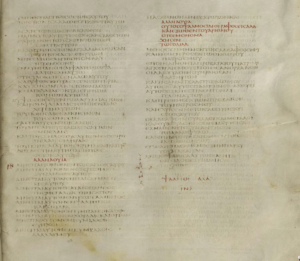
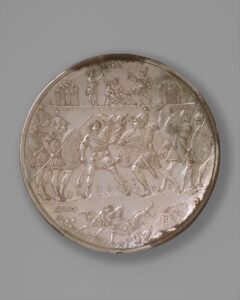




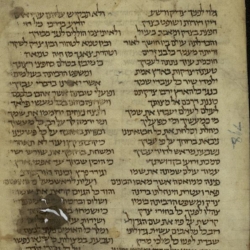
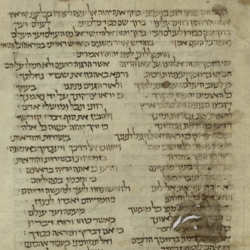
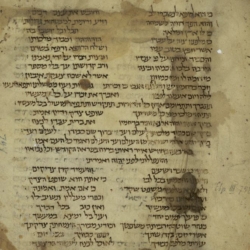


Leave a Reply